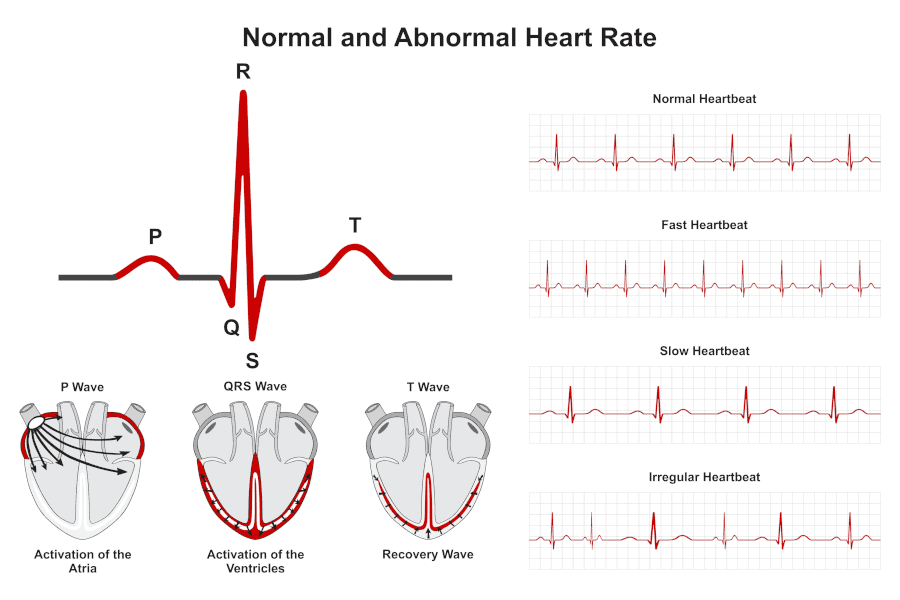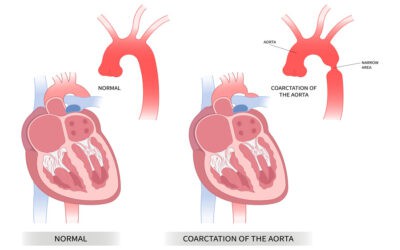In a normal, healthy heart, there is a consistent and regular rhythm of electrical impulses that coordinate the contraction and relaxation of the heart muscle, allowing it to pump blood efficiently. There are quite a few causes that can explain why a person might develop an irregular heartbeat.
Typically, the human heart beats and functions at a normal pace and follows a normal pattern. However, in the case of an irregular heartbeat, this electrical activity becomes disrupted, leading to an irregular or abnormal heartbeat. The heart may beat too fast (tachycardia), too slow (bradycardia), or have an irregular pattern, such as skipped beats or extra beats.
What is tachycardia?
According to the American Heart Association, normal human heart rate is 60 – 100 beats per minute.
Tachycardia refers to a condition where adults experience a higher than normal heart rate, typically at over 100 beats per minute.
Tachycardia can be caused by various factors, including stress, physical activity, certain medications, medical conditions, and underlying heart problems. It can occur as a result of abnormal electrical signals in the heart’s conduction system or due to other triggers that increase the heart rate.
If a person notices they are experiencing this type of irregular heartbeat, it is crucial to visit a doctor to determine the cause. Untreated tachycardia can lead to a number of serious issues, such as a decrease in blood flow and oxygen supply to the body, an increased risk of developing blood clots, an increased risk of developing heart disease, and a risk of developing even more serious arrhythmia issues beyond the tachycardia itself.
What is bradycardia?
The Mayo Clinic explains that bradycardia is a condition where the heart beat goes below 60 beats per minute when at rest.
In some situations, bradycardia is normal. For example, healthy young adults and athletes may have a naturally lower resting heart rate. Most people experience bradycardia when they are sleeping – since the body is totally at rest during sleep, it isn’t unusual for a person’s heart rate to drop below 60 at this time.
Untreated bradycardia can cause serious problems within the human body. If the heart pumps oxygen-rich blood too slowly, it can cause damage to organs. A person should see a doctor immediately if they think they may have signs of bradycardia, which can include shortness of breath, tiredness or fatigue, fainting, confusion, memory problems, or chest pains.
What does it mean when the human heart experiences skipped or extra beats?
The American Heart Association describes the sensation of the heart skipping beats or having extra beats as having palpitations. Palpitations can occur due to various reasons, and it’s important to consult with a healthcare professional for a proper evaluation and diagnosis.
Some common reasons why a person might experience skipped or extra heartbeats include hormonal changes, excessive stress, or anxiety, or underlying medical conditions. In some instances, palpitations can be caused by specific types of lifestyle choices, such as over-consuming caffeine or using products that contain nicotine.
It’s essential to consult with a healthcare professional for a proper evaluation and diagnosis if you are experiencing palpitations or any concerning symptoms related to your heart rhythm. While some solutions to palpitations might be easy to fix, such as eliminating nicotine or cutting back on caffeine, other causes may require more professional medical intervention to correct.
How can you tell if you might have issues with irregular heartbeat?
Detecting an irregular heartbeat, also known as arrhythmia, can be done through various methods. While some people with arrhythmia may experience noticeable symptoms, others may not have any obvious indications. If you suspect you may have an irregular heartbeat, here are some common signs to consider:
- Palpitations: Sensation of a racing, fluttering, pounding, or irregular heartbeat. You may feel your heart is skipping beats or adding extra beats.
- Fatigue and weakness: Feeling unusually tired or weak, even with normal activities.
- Shortness of breath: Difficulty breathing or feeling breathless, especially during physical exertion.
- Dizziness or lightheadedness: Feeling dizzy, lightheaded, or faint.
- Chest discomfort: Uncomfortable sensations in the chest, such as pain, pressure, or tightness.
- Fainting or near-fainting episodes: Losing consciousness or feeling like you might pass out.
It’s important to note that these symptoms can also be caused by other conditions and experiencing them does not necessarily mean you have an irregular heartbeat. To obtain an accurate diagnosis, you should make a plan to contact your doctor for a checkup.
How does a doctor determine whether or not you have an irregular heartbeat?
A healthcare professional can conduct a thorough evaluation to determine if you have an irregular heartbeat. They may perform the following to figure out if you are actually experiencing irregular heartbeat:
1. Physical examinations: The doctor will listen to your heart using a stethoscope to check for any abnormal sounds or rhythms.
2. Electrocardiogram (ECG or EKG) tests: This test records the electrical activity of your heart and can detect abnormal heart rhythms.
3. Holter monitors: A portable device that records your heart’s activity over a 24-hour or longer period, providing a continuous ECG recording.
4. Event monitors: This device is similar to a Holter monitor, but it is worn for a longer period of time, typically 30 days, or only when you experience symptoms.
5. Echocardiogram tests: This ultrasound test uses sound waves to create a detailed image of your heart’s structure and function, helping identify any underlying issues.
If you suspect you have an irregular heartbeat or experience concerning symptoms, it is always best to make an appointment with your doctor. Medical professionals will have access to the best tools, tests, and equipment to determine whether or not you are experiencing irregular heartbeat issues.









